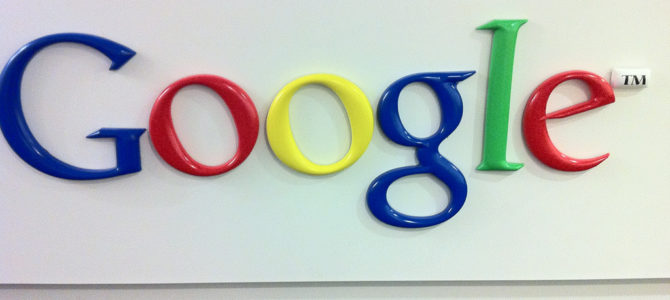
In what has to be the world’s biggest example of the Streisand Effect, a Google-funded center-left think tank kicked out a group of scholars who were promoting the idea that Google is a dangerous monopoly—and now guess what everybody’s talking about? They’re talking about how Google is a dangerous monopoly and complaining about how everyone in the online publishing industry is just “A Serf on Google’s Farm,” as Josh Marshall of Talking Points Memo puts it. That’s not overdramatic at all.
To make things even worse for Google, those on the Right who might otherwise be inclined to defend free markets and to side with a successful corporation against meddling bureaucrats are sitting this one out. Google has recently done a few things—firing an engineer for a politically incorrect memo, or capriciously “demonetizing” YouTube accounts, which seems to be targeted at the political right—that makes the company look like it’s taking sides in the culture war. This has led some on the Right to call for “crushing regulation” of Google and other tech giants as a form of payback for being political enemies. (Apparently the consensus on the #MAGA wing of the right is, “We control the reins of power for a few brief moments, so let’s make sure we abuse it for blatantly partisan purposes.” That will probably end well.)
But all this talk about Google being a “monopoly” is sloppy and overwrought.
I’ve been around long enough in Internet publishing to know that there’s a lot of truth to what Marshall writes. Google definitely has a wide and pervasive influence on the ability to publish and make money on the Web, based on the way it has built an entire online advertising system from beginning to end. Yet Marshall is forced to acknowledge the more nuanced reality. His headline blares that we are “Serfs on Google’s Farm,” but three paragraphs in, he avers that “Google isn’t some kind of thralldom we’ve lived under,” which implies the exact opposite. So I guess the headline was just clickbait, which seems kind of appropriate to the current media era.
A Monopoly Means One, Not Five
Moreover, I would regard Marshall’s warning as more ominous if he didn’t couch it in these terms: “Google is a big, big problem. So is Facebook. So is Amazon.” You see the same thing in an article from the pro-Trump Right arguing for trust-busting against the Big Five tech firms, which proclaims that “Apple, Alphabet (Google’s corporate parent), Microsoft, Facebook, and Amazon…are the new Robber Barons.” So Google is a monopoly that controls everything—and so is Facebook, and so is Amazon, and so is Apple, and so is Microsoft. You see the problem? Each of the Big Five can’t be the monopoly that controls everything.
To be sure, each of these companies has areas where it has become dominant. But that is the result of often brutal competition in which each has tried to steal some of the others’ core business. Google tried (and failed) to take on Facebook with Google Plus. Microsoft’s Bing has tried and so far failed to take away the search business from Google. Google web hosting is trying to take away some very profitable business from Amazon. Apple has tried to take on Amazon in e-books. And so on.
The crucial issue of “monopoly” is not whether a company has a large market share; that’s not proof of lack of competition, only proof that one firm is winning the competition (for now). The key issue is the presence of other potential competitors with the capital and expertise necessary to mount a credible threat should the market leader become arrogant or complacent. That is precisely the prospect that each of these big tech firms faces, thanks to the presence of the other big tech firms, as well as a massive complex of Silicon Valley venture capitalists who are all looking for the startup that will become the new Google or Apple or Facebook.
Google’s ‘Monopoly’ Hasn’t Lasted Long, Either
Note also that Google’s “monopoly” position—as with the leading market position of most of these other firms—is relatively recent. The system Marshall describes is the way things have been done for the last five to ten years, yet it is treated as if this is the permanent new order that is going to last forever unless government intervenes.
In reality, such technological dominance is fragile and tends to be temporary. This is a lesson we ought to have learned from the last big tech “monopoly” scare. Back in the late 1990s, I spent some time defending Microsoft against charges that it was quashing competition and trying to control the entire technology industry by giving PC manufacturers a big incentive to pre-install the Windows operating system. Also, Microsoft was going to ensure its dominance by bundling a Web browser with its operating system.
Somehow, this did not actually ensure Microsoft’s dominance. What actually happened was that Apple recovered from its mid-1990s slump and started putting out devices so good they lured people away from Windows PCs, which became decidedly unhip, and into the closed system of the Mac OS. Then the Web browser became more or less a commodity product that was far less useful than a Web search portal, and Google—which didn’t even exist at the beginning of the Microsoft monopoly panic—rose up to dominate that category.
Then everybody started accessing information from their smartphones, so it no longer matters what operating system people have on their desktop PCs, if they even have one. And what are we all doing on our smartphones? Wasting time on social media apps like Facebook, where we get all of our news, fake and otherwise, at the expense of traffic on the rest of the Internet.
So the lesson is that technology changes and suddenly the thing that looked like it made one company totally dominant becomes totally irrelevant.
Remember, Pride Goeth Before a Fall
That’s not to say that the complaints we’re hearing against the big technology companies are not valid. I like Marshall’s point about how Google has gotten so used to treating users and their information as the product to be sold that they have no idea how to treat actual, paying customers. But that is just the natural arrogance of big companies that have gotten used to rapid growth, high profit margins, plenty of cash rolling around, and lots of positive publicity and goodwill from the public—who then squander all of these advantages because they imagine themselves to be invulnerable and forget that they were once the upstarts who took down established firms. Isn’t that what Apple and Microsoft (and others) did to onetime giants like Xerox, Hewlett-Packard, and IBM?
To the extent these complaints about “monopolies” capture pent-up resentment against the big tech companies on the part of customers who are not being well served, that represents a huge opportunity for one of the other big tech companies, or for a scrappy startup, to go out there and develop the new platform that is going to serve customers better.
Yet for the most part, the complaints we’re hearing are not serious attempts to find better ways to serve customers. They are attempts to displace onto Google or Facebook or another big corporation some kind of bigger and more fundamental frustration with the world.
On the Right, the obvious frustration is the way the Left has turned against free speech, particularly after the recent clash in Charlottesville, and is using a campaign against “hate” as an excuse to beat down all of its culture war opponents on the Right. There is good reason to worry that companies like Google are already using their influence to enforce that political bias, but the problem didn’t begin with them. It began in the universities, which are a much better example of a government-backed cartel.
Google Is Also Part of the Solution Right Now
As for Marshall, you have to understand that his complaints come from a very narrow, very specific, almost parochial context: the plight of small and medium-sized Internet publishers during the past ten years. His complaint is that the decisions of multi-billion-dollar corporations—and of millions of consumers—has not aligned perfectly with what would be best for this one little niche within the publishing world. Well, who expected that it would?
The real context for publishers that we are all still trying to cope with the shattering impact of the Internet, and we’re all dealing with our implicit demotion from high-minded public intellectuals to generic, interchangeable “content providers” thrown into an undignified scrabble for clicks. It’s a revolution that smashed down barriers to entry and bypassed the old media gatekeepers, but it has also made the whole business model of publishing tenuous and uncertain.
Believe me, I’ve been there for the whole thing. I started out as a professional writer in the early 1990s, back when we used to print things on paper and send them through the mail. (If you want to talk about monopolies that live in blissful disregard for the needs of their customers, let’s talk about the U.S. Postal Service.) Since then, I’ve worked for and sometimes run publications using practically every variation of Internet business model: an online newsletter that depends on paying subscribers, a free blog that exists to promote the paid subscriptions, an advertising-supported Web site that lives on its clicks, news aggregation that corrals content from other sources on the Web, and so on. Heck, I’m involved in several of those models concurrently at the moment.
The question of “how do we make money now” has consumed everyone in publishing for the past two decades, and as Marshall points out, Google has been part of the solution, making it ridiculously easy for small- and medium-sized publishers, who operate according to the lean and understaffed rules of the new era, to connect their sites to a stream of advertising revenue without having to have any real advertising staff.
But, as I pointed out, that’s only one of the solutions that some companies have relied on for about the past ten years. We were all using different platforms and different business models before then, and in another ten years, we might find ourselves doing something else. Perhaps we will all be providing completely different content for a nation of pod-people who spend all of their time in virtual reality instead of on social media. The one thing I can guarantee you is that things will still be difficult for writers and editors and publishers, because they always have been. Such is the way of things.
Google could do a better or worse job at what it’s doing, and it can make the deal for writers and publishers better or worse. But the idea that this is some kind of permanent monopoly that can only be fixed by government intervention is short-sighted and parochial. The situation Marshall sketches out is a snapshot of a particular era for a particular type of company. But this, too, shall pass.
That’s why we should cool it with all the talk about a Google monopoly and go back to being much more concerned about the unaccountable monopoly that is the federal bureaucracy.
Follow Robert on Twitter.








